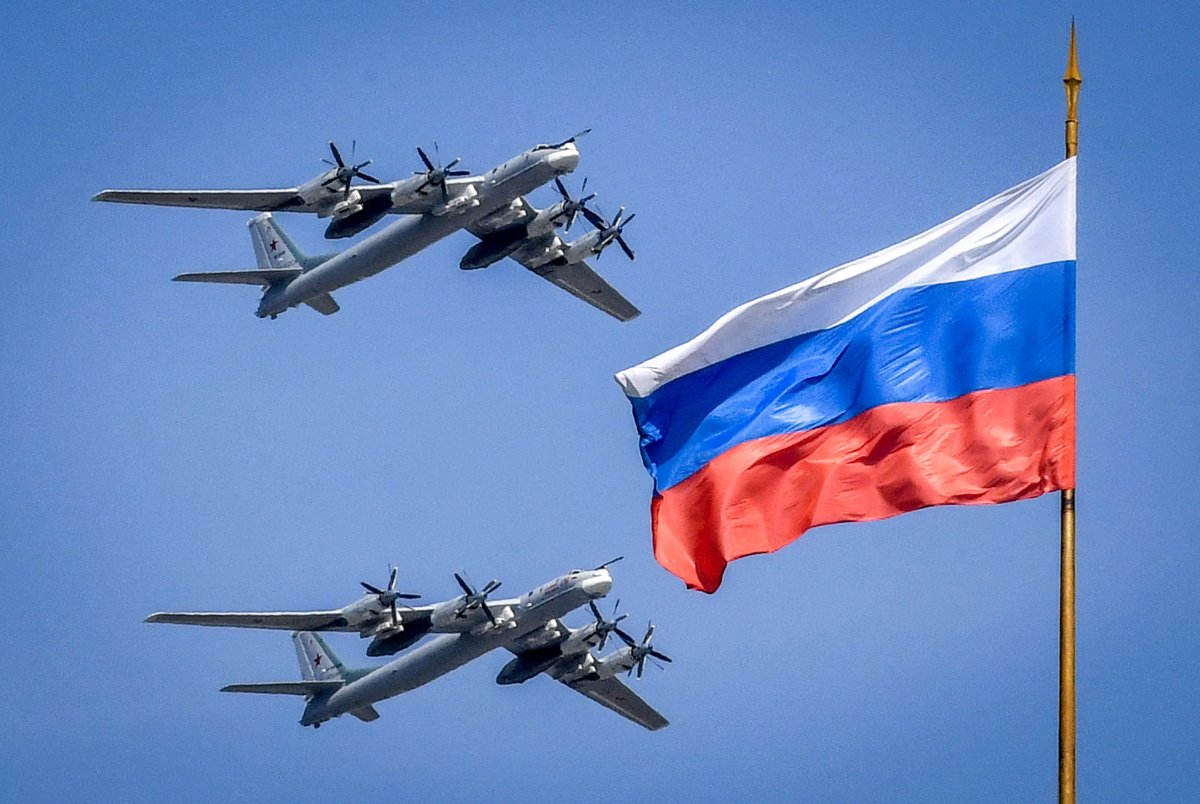As Russian President Vladimir Putin's invasion of Ukraine continues, it is taking a huge toll on the Russian economy, but Western sanctions—and Moscow's countermeasures—have also hurt European economies.
As a result, there is a growing chorus of voices across Europe and the U.S. calling for a compromise solution, one that could potentially include "security guarantees" for Russia.
The latest such sentiment, voiced by French President Emmanuel Macron, was widely rebuked by Ukrainian officials, who pointed to the Budapest Memorandum and its outcomes in their response.
But what exactly was this document, and did Ukraine really voluntarily give up its nuclear weapons in exchange for independence after the Soviet Union collapsed?

The Claim
A number of social media users, including Ukraine's officials, have referenced the Budapest Memorandum in recent comments responding to Macron's proposal.
"OTD in 1994 Russia signed the Budapest memo, guaranteeing Ukraine's territorial integrity in exchange for their nukes," Darth Putin, a political satire account, posted Monday, receiving around 12,500 engagements.
"Russia needs security guarantees now, @EmmanuelMacron...."
OTD in 1994 Russia signed the Budapest memo, guaranteeing Ukraine's territorial integrity in exchange for their nukes.
— Darth Putin (@DarthPutinKGB) December 5, 2022
Russia needs security guarantees now, @EmmanuelMacron .... pic.twitter.com/eM90v3lNmD
"On Budapest Memorandum anniversary, 'collective guarantees for RF' topic looks intriguing," tweeted Mykhailo Podolyak, an adviser to the office of Ukrainian President Volodymyr Zelensky, in a post with more than 4,500 engagements.
"But if Moscow really needs it... 🇺🇦 can guarantee Russia's security in exchange for Moscow's complete nuclear weapons renunciation. We can sign contract in the same city – Budapest, Hungary."
The Facts
Despite Moscow's unfounded claims to the contrary, Ukraine does not have any nuclear weapons, having indeed given them up in 1994 under an agreement known as the Budapest Memorandum.
Following the collapse of the Soviet Union in 1991, thousands of nuclear arms were abandoned in Ukraine, leaving Kyiv at the time with the third-largest nuclear arsenal in the world.
However, the Budapest Memorandum, signed on December 5, 1994, resulted in a multilateral agreement affirming Ukraine's security and sovereignty in exchange for giving up the nuclear stocks.
The United States, the United Kingdom, and Russia were among the signatories, as was Belarus, Kazakhstan and Ukraine itself.
The "Memorandum" was in fact part of three separate documents, signed by the three leaders of the ex-Soviet nations, with U.K., U.S. and Russia acting as co-signatories (and China and France providing individual assurance).
The question of whether the three nuclear powers provided "guarantees" to Ukraine, however, is a more complicated one, and it was a source of much discussion and argument even during the original multilateral negotiations.
Under the agreement, Belarus, Kazakhstan, and Ukraine became the parties to the Treaty on the Non-Proliferation of Nuclear Weapons, leaving their nuclear arsenals to Russia.
In exchange, they were promised that Russia would:
- Respect the signatory's independence and sovereignty in the existing borders.
- Refrain from the threat or the use of force against the signatory.
- Refrain from economic coercion designed to subordinate to their own interest the exercise by the signatory of the rights inherent in its sovereignty and thus to secure advantages of any kind.
- Seek immediate Security Council action to provide assistance to the signatory if they "should become a victim of an act of aggression or an object of a threat of aggression in which nuclear weapons are used".
- Refrain from the use of nuclear arms against the signatory.
- Consult with one another if questions arise regarding those commitments.
However, tellingly absent from the document is reference to any recourse action or enforcement mechanism which would be triggered if one of the parties broke the deal.
In fact, as the agreement was taking shape, U.S. State Department lawyers highlighted a distinction between "security guarantee" and "security assurance," with the former entailing a military response by the co-signatory countries if one of the sides were to violate the agreement.
The parties eventually settled on softer language in the English version of the agreement, offering Ukraine "security assurance" that would simply specify the non-violation of these parties' territorial integrity.
That decision caused some consternation in Kyiv, which was initially reluctant to sign but backed down after U.S. President Bill Clinton implied that such refusal could damage bilateral Ukraine-U.S. relations, according to those involved in the negotiations.
Notably, the word "guarantees" remained in the titles of both Russian and Ukrainian translations of the agreement, though an equivalent of "assurances" was then used in the body of the documents, adding to the confusion.
"One key detail took place in a joint meeting of the three delegations," former U.S. Ambassador to Ukraine Brooking's Steven Pifer, now senior fellow at the Brookings Institution's Center on the United States and Europe, recalled in a 2011 paper titled "The Trilateral Process: The United States, Ukraine, Russia and Nuclear Weapons."
"English draws a distinction between 'guarantee' and 'assurance,' while both words translate into 'guarantee' in Ukrainian and Russian. U.S. officials read for the formal negotiating record a statement to the effect that, whenever 'guarantee' appeared in the Ukrainian and Russian language texts of the Trilateral Statement, it was to be understood in the sense of the English word 'assurance.'
"The Ukrainian and Russian delegations confirmed that understanding."
According to Pifer, a diplomat who was directly involved in the drafting of the Memorandum, the general consensus among the signatories was that if there was a violation, there would be a response incumbent on the U.S. and the U.K.
Pifer later stated that while the nature of that response was not explicitly defined, "there is an obligation on the United States that flows from the Budapest Memorandum to provide assistance to Ukraine, and [...] that would include lethal military assistance".
Following Russia's annexation of Crimea in 2014, Canada, France, Germany, Italy, Japan, the U.K., and U.S. claimed that Russian involvement was a breach of its Budapest Memorandum obligations to Ukraine and a violation of Ukrainian sovereignty and territorial integrity.
At the time, Putin (who initially denied Russia's military involvement in the 2014 annexation, but later backtracked on those comments) argued that the removal from power of Viktor Yanukovich, Ukraine's pro-Moscow leader, amounted to a "revolution."
"[Because of that] a new state arises, but with this state and in respect to this state, we have not signed any obligatory documents," Putin said at a press conference.
Later, in 2016, Russian Foreign Minister Sergei Lavrov also argued—contradicting the historical records—that "Russia never violated the Budapest memorandum," because it "contained only one obligation, not to attack Ukraine with nukes."
But while few found those lines of argument convincing, there was a lot less certainty or consensus on how to respond to Putin's landgrab.
In March 2014, shortly after the annexation, then-U.S. Secretary of State John Kerry said in a television interview: "You don't just invade another country on phony pretexts in order to assert your interests. There are ways to deal with this and President Putin knows that."
But even at the time historians already saw the weakness of the agreement being exposed: The Memorandum offered no guarantee of intervention.
"It gives signatories justification if they take action, but it does not force anyone to act in Ukraine," Stephen MacFarlane, professor of international relations specializing in the former Soviet Union at St Anne's College, Oxford, told FRANCE 24 back in 2014. "Kerry's harsh remarks on what is going on in Ukraine indicate a degree of resolve, but at the end of the day, what can you do?"
After Russia took Crimea, the Western nations had indeed stopped short of a military intervention, which would have been inevitable had the term "guarantee" been used instead.
But both the United States and its allies have since consistently provided economic, logistical, and military support to Ukraine, in line with what the 1994 document appeared to entail for this kind of scenario. The annexation and the ensuing simmering conflict with Kyiv also resulted in Russia's suspension from the G8 and wide-ranging economic and trade sanctions by the West.
Notably, as part of the agreement, Ukraine had also given up its strategic bombers, including Tu-160 and Tu-95, as well as its cruise missiles.
"The situation around Ukrainian bombers changed after the war in Yugoslavia," Russian newspaper Kommersant reported in February 2000.
"Back then Moscow offered Kyiv a deal: in exchange for the eight Tu-160s and three Tu-95MS still capable of flying, it agreed to reduce Ukraine's debt for Russian gas by $285 million. At the same time, along with the bombers, Ukraine agreed to hand over to Russia 575 cruise missiles that are in service with said aircraft, as well as airfield equipment," the article said, in Russian.
The agreement on the transfer of bombers was signed in Yalta in October 1999, the article noted, and "three days later, the first Tu-160 and Tu-95MS arrived in Engels [airbase] and became part of the 37th Strategic Air Army."

Russia is reported to have deployed both against Ukraine in its ongoing "special military operation." Some of those strategic bombers were initially hosted at the Engels airbase near Saratov, which was hit this week by what Russia claims were Ukrainian drones.
Two TU-95 planes were damaged in the attack, Russian and Ukrainian sources have claimed, though Newsweek is unable to confirm if those were part of the group that Ukraine handed over in the 90s.
Newsweek has reached out to Steven Pifer, the Office of President Zelensky, the Russian Foreign Ministry, and President Emmanuel Macron's office for comment.
The Ruling
Needs Context.

The Budapest Memorandum, signed in December 1994, resulted in Ukraine voluntarily handing over its nuclear arsenal, as well as other military stocks and munitions, to Russia.
In exchange, Moscow vowed to respect Ukraine's sovereignty, security, and territorial integrity.
The U.S. and the U.K. were among the co-signatories, but stopped short of providing "guarantees" (which would have entailed a direct military intervention) and instead offered "assurances," a term that left some wiggle room for a response to potential aggression from Moscow.
FACT CHECK BY NEWSWEEK
Uncommon Knowledge
Newsweek is committed to challenging conventional wisdom and finding connections in the search for common ground.
Newsweek is committed to challenging conventional wisdom and finding connections in the search for common ground.
About the writer
Yevgeny Kuklychev is Newsweek's London-based Senior Editor for Russia, Ukraine and Eastern Europe. He previously headed Newsweek's Misinformation Watch and ... Read more





